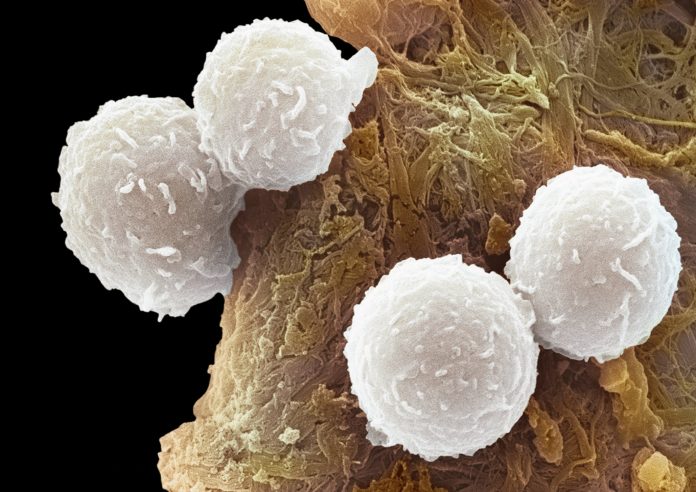
Researchers from Sylvester Comprehensive Cancer Center, Memorial Sloan Kettering, and other institutions report that a new BTK-targeting drug compound has shown promise to overcome treatment resistance of chronic lymphocytic leukemia (CLL). The results of the Phase I research, published today in the journal Science, show that the compound called NX-2127 from Nurix Therapeutics, could offer a therapeutic option for patients whose tumors become drug-resistant or are unresponsive to frontline treatment.
“This new compound not only inhibits the cellular molecule BTK but goes further by taking aim at the target and destroying it,” said the study’s senior author Justin Taylor, MD, a hematologist-researcher at Sylvester. “It’s a new and exciting drug class called BTK degraders.”
Currently, many patients diagnosed with CLL are prescribed drugs called BTK (Bruton’s tyrosine kinase) inhibitors that have been shown to shrink tumors, lessen symptoms, and increase life expectancy. This class of approved drugs works by binding to the BTK enzyme that acts to keep B cells alive. This binding to BTK quells its activity leading to B-cell death in CLL and other hematologic malignancies. But the tumors can become resistant to this class of drugs, which only modulate the activity of the target and don’t destroy it.
For this new Phase I research of NX-2127, Taylor and colleagues sought to discover how well the BTK-targeting drug candidate worked in CLL patients whose tumors had either become drug-resistant or whose tumors didn’t respond to their first treatments. NX-2127 is built from two modules: the first binds it to BTK and the second degrades and eliminates it.
The team’s research showed that NX-2127 destroyed the drug’s target in both petri dishes and in patient cells. “More specifically, this compound destroyed BTK cells in tumors resistant to currently used BTK inhibitors, while shrinking tumors in 11 of 14 CLL patients participating in our study,” said Omar Abdel-Wahab, MD, of Memorial Sloan Kettering Cancer Center and co-corresponding author with Taylor.
While the data cutoff for the paper published today in Science was in September 2022, the research team provided an update to the ongoing study in December at the American Society of Hematology (ASH) Annual Meeting in San Diego. Overall, 41% of patients have responded to NX-2127 and the research showed that drug resistance can occur when BTK acquires mutations that give it a different function. These mutations allow it to act as a scaffold that recruits other molecules to keep the B cells alive. The most significant finding the researchers noted, however, was that NX-2127 appears to overcome all resistance caused by all the BTK mutations known to cause resistance to BTK inhibitors.
Based on their findings in CLL, the researchers believe that this new class of BTK-targeting drugs, BTK degraders, has the potential to treat other B-cell malignancies and perhaps even certain autoimmune diseases such as multiple sclerosis. Accordingly, Taylor and his Sylvester colleague Alvaro Alencar, MD, are actively enrolling patients for the study of another, potentially more potent and selective BTK degrader, NX-5948.













